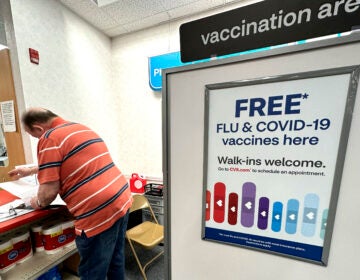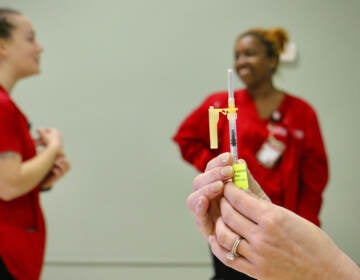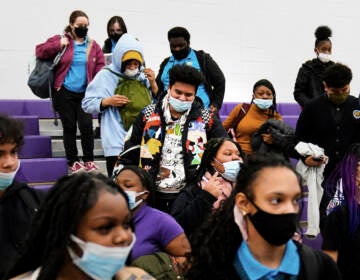Coronavirus update: N.J. unemployment climbs, schools will stay shut
New Jersey paid out $336 million in benefits in the last month. And some workers are now getting $600 supplemental payments.
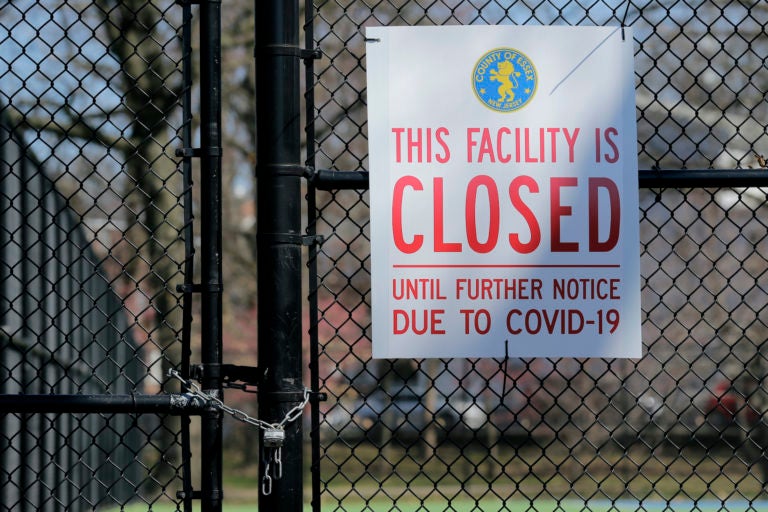
A sign is displayed on locked tennis courts in Branch Brook Park in Newark, N.J., Thursday, March 26, 2020. (Seth Wenig/AP Photo)
Are you on the front lines of the coronavirus? Help us report on the pandemic.
Updated: 4:20 p.m.
New Jersey officials reported another 4,391 cases of coronavirus cases on Thursday, with the state’s total now at 75,317.
Gov. Phil Murphy also said another 362 people have died, bringing the state’s total number of fatalities to 3,518.
N.J. schools to remain closed through May 15
New Jersey’s schools will remain closed through at least May 15, Murphy said Thursday.
The state’s nearly 600 public districts, plus charters, religious and other schools, have not held in-person classes since March 16, but are doing remote instruction. Other states, like Pennsylvania, have already extended school closures through the end of the academic year.
“If we all continue to stay the course for the next four weeks … we may have a different message at that point,” Murphy said, referring to social distancing guidelines. “It’s up to all of us to stay at it.”
AG launches probe into nursing homes
Following shocking reports that a North Jersey nursing home had stacked the bodies of 17 deceased residents in a makeshift morgue, Murphy asked the attorney general to launch an investigation into that facility and others with large numbers of deaths during the COVID-19 pandemic.
“We can and must do better,” Murphy said.
The discovery of the bodies at the Andover Subacute and Rehabilitation Center I and II in Sussex County — the largest long-term care facility in the state — is perhaps the most dramatic illustration to date of how the outbreak has overwhelmed New Jersey’s nursing homes and assisted living residences.
To date, 379 such facilities in New Jersey have experienced at least one confirmed case of COVID-19. Of the 362 fatalities reported Thursday, 54 were residents there, officials said.
Unemployment climbs as $600 payments begin
New Jersey unemployment claims dipped last week to about 141,000, down from the record-shattering mark set in the previous two weeks but still exorbitantly high by historical standards.
More than 700,000 New Jersey workers have now filed for unemployment benefits in the past month, the latest state figures show, and some 430,000 are now receiving payments.
Both totals are unprecedented and expected to grow as strict social distancing policies remain in effect and the state works through a backlog of claims. The New Jersey Department of Labor says it has made technology upgrades and added staff to process claims faster.
Nationally, about 22 million Americans — or about 14% of the labor force — have filed initial jobless claims in the past month.
Over that time, New Jersey paid out $336 million in benefits. State officials said workers currently receiving unemployment benefits also started to receive their first $600 supplemental payments, as authorized by federal stimulus legislation.
Borrowing to plug budget holes?
Murphy on Thursday floated the idea of borrowing up to $9 billion through a controversial Federal Reserve program after he said a day earlier that state revenues are “falling off the cliff” due to the virus-induced economic slowdown.
The governor said he didn’t know how much the state might need, but the scale of the borrowing could be among the largest bond issues in New Jersey history and, depending on how it is structured, come with tremendous interest costs.
The $3 billion worth of bonds that former Gov. Christie Whitman issued in the 1990s to fund the state’s pension system, for example, will cost $11 billion to repay by 2029, Senate President Stephen Sweeney said last week. For now, though, the Fed has said it will only buy short-term debt with a maturity of no longer than 24 months.
Murphy said he would much prefer direct cash assistance from the federal government, but it’s unclear whether Congress and President Trump will agree to that.
“What happens if we don’t have [borrowing] as an option and we don’t get the federal money?” Murphy said. “Folks should assume we’re going to have to gut programs, and that will affect everybody in this entire state.”
WHYY is your source for fact-based, in-depth journalism and information. As a nonprofit organization, we rely on financial support from readers like you. Please give today.


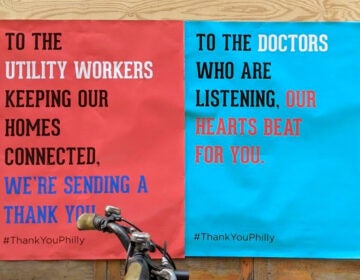
![CoronavirusPandemic_1024x512[1]](https://whyy.org/wp-content/uploads/2020/03/CoronavirusPandemic_1024x5121-300x150.jpg)
